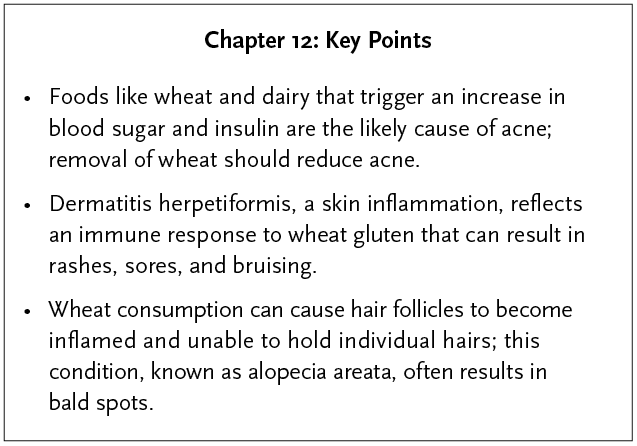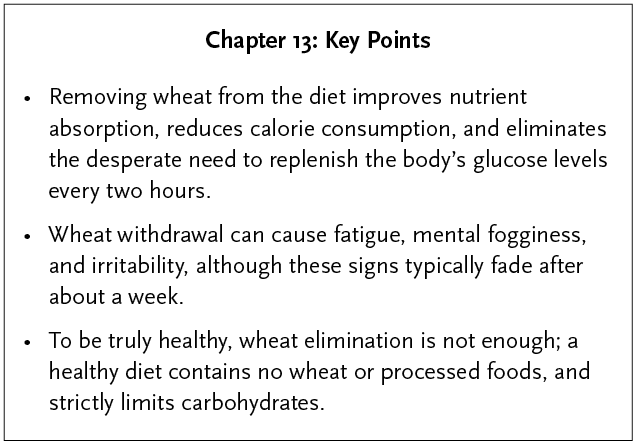Summary: Wheat Belly ...in 30 Minutes (7 page)
Read Summary: Wheat Belly ...in 30 Minutes Online
Authors: 30 Minute Health Summaries

BAGEL FACE: WHEAT'S DESTRUCTIVE EFFECT ON THE SKIN
Overview
The skin is the largest organ in the body, and is not immune from the effects of wheat. Wheat can age the skin because it increases the production of AGEs, which cause wrinkles and loss of elasticity. But acne, rashes, and hair loss can also be caused by high blood sugar levels or immune responses associated with wheat or gluten intolerances. Davis suggests that when wheat is eliminated from the diet, these conditions not only improve but also may be reversed.

“Wheat expresses itself â actually, the body's
reaction
to wheat expresses itself â through the skin. . . . Skin changes generally do not occur in isolation: If an abnormality due to wheat is expressed on the skin surface, then it usually means that the skin is not the only organ experiencing an unwanted response.”
â Dr. William Davis,
Wheat Belly

Chapter Summary
The complexions of contemporary cultures who eat a diet free of wheat and sugar are acne-free. Insulin stimulates the release of the hormone IGF-
1
(introduced in Chapter 8), which promotes tissue growth in hair follicles, and, together with insulin itself, stimulates production of sebum, an oily protective film. Skin tissue growth and overproduction of sebum lead to acne.
Dairy is also a culprit, Davis says. It's not the fat content, but the high glycemic index of dairy products like cow's milk, which in turn triggers insulin production. A study of college students found that those who ate the lowest glycemic index diet had a nearly 50 percent reduction in acne.
Dermatitis herpetiformis, or DH, is an itchy, bumpy skin inflammation that reflects an immune response to gluten. DH can manifest as oral ulcers, rashes, bruising, and lesions, and can be treated with strict elimination of wheat and gluten sources. According to Davis, people who suffer from DH do not experience the typical gastrointestinal symptoms of celiac disease but do still show evidence of intestinal inflammation and damage to the small intestine.
After acne, DH is the most common skin response to wheat gluten. But there is a long list of wheat glutenârelated skin problems that can be improved or cured by eliminating wheat gluten from the diet.
When wheat provokes an immune response in the skin, hair loss can follow. Alopecia areata is a condition in which hair follicles become inflamed and lose their ability to hold on to individual hairs. Alopecia areata most commonly results in bald patches on the scalp, but, in extreme cases, it can leave a person hairless from head to toe. As with the other skin conditions mentioned in this chapter, Davis suggests that eliminating wheat can reverse this condition.

“[S]kin conditions triggered by wheat gluten range from simple nuisance to disfiguring disease. . . .
[I]n
the aggregate, they add up to an impressive list of socially disruptive, emotionally difficult, and physically disfiguring conditions.”
â Dr. William Davis,
Wheat Belly



GOODBYE, WHEAT: CREATE A HEALTHY, DELICIOUS, WHEAT-FREE LIFE
Overview
While a desire to change eating habits seems obvious, making that change can present energy, mood, and willpower challenges. Davis suggests that committing to a wheat-free lifestyle and enduring the necessary wheat withdrawal will be worth it in the end, promising better health, increased weight loss, and improved happiness. Fill the gap left by wheat with vegetables, nuts, meats, eggs, avocados, olives, cheese â in other words, unprocessed, whole foods.

“Let me describe a typical person with wheat deficiency: slender, flat tummy, low triglycerides, high HDL (âgood') cholesterol, normal blood sugar, normal blood pressure, high energy, good sleep, normal bowel function.”
â Dr. William Davis,
Wheat Belly

Chapter Summary
As we've learned over the course of
Wheat Belly
, removing wheat from the diet has the potential for incredible health-related benefits. Davis says that because a wheat-free diet improves gastrointestinal health, it also promotes enhanced absorption of vitamin B
1
2, folate, iron, zinc, and magnesium. Without the presence of appetite-stimulating exorphins that wheat creates, hunger and cravings between meals disappear and the body no longer experiences the glucose-insulin cycle every two hours.
The best way to eliminate wheat is all at once â although about 30 percent of people who do so will experience wheat withdrawal, including fatigue, mental fogginess, irritability, low mood, and sadness. These symptoms usually only last a week or two.
It is important to note that simply removing wheat will not eliminate all health issues. Many modern, processed foods affect the body's blood glucose levels in much the same way that wheat does. Davis recommends strictly controlling carbohydrate consumption and avoiding all processed foods. He includes a recommended diet following these guidelines:
- Eat vegetables: Vegetables are rich in nutrients and should make up the majority of the diet.
- Eat
some
fruit: Fruits are high in sugars and should be consumed in limited quantities. - Eat raw nuts: Nuts are filling and full of fiber, monounsaturated fats, and protein.
- Use oils generously: Stick with healthy oils like extra-virgin olive oil, coconut oil, avocado oil, and cocoa butter, but avoid frying, which triggers AGE formation in oil.
- Eat meats and eggs: Try to eat meat from grass-fed livestock.
- Eat dairy products: Full-fat cheeses can be enjoyed without limit, while other dairy sources should be limited to one to two servings per day.
- Odds and ends: Olives, avocados, pickled vegetables, and raw seeds provide variety. Flaxseed is the one grain that is free of carbohydrates that increase blood sugar; it can be eaten freely.

“If the gap left by wheat is filled with vegetables, nuts, meats, eggs, avocados, olive, cheese â i.e. real food â then not only won't you develop a dietary deficiency, you will enjoy better health, more energy, better sleep, weight loss, and reversal of all the abnormal phenomena we've discussed.”
â Dr. William Davis,
Wheat Belly


CONCLUSION
Wheat makes up the largest part of Americans' diets â more than any other food group or type. A look at your average grocery store reveals aisles dominated by wheat breads, wheat cereals, wheat snacks, wheat pastas, and even wheat frozen dinners. Combine this wheat overload with national health guidelines that stress the importance of a diet high in whole grains, and you get a nation of people who suffer from wheat belly. According to Davis, incidences of diabetes and prediabetes, heart disease, and celiac disease â all conditions linked to wheat consumption â are on the rise. Wheat affects weight, complexion, sleep, mood, and immunity, and yet Americans continue to consume it in unprecedented amounts.
Wheat Belly
explores the rewards of a life without wheat. Davis asserts that eliminating wheat lowers blood sugar, AGE, triglyceride, and small LDL particle levels, decreases insulin and visceral fat production, and leads to rapid and dramatic weight loss. Removing wheat also improves bone and joint health, heart health, and brain health. According to Davis, a life without wheat is a longer, healthier, and happier life.